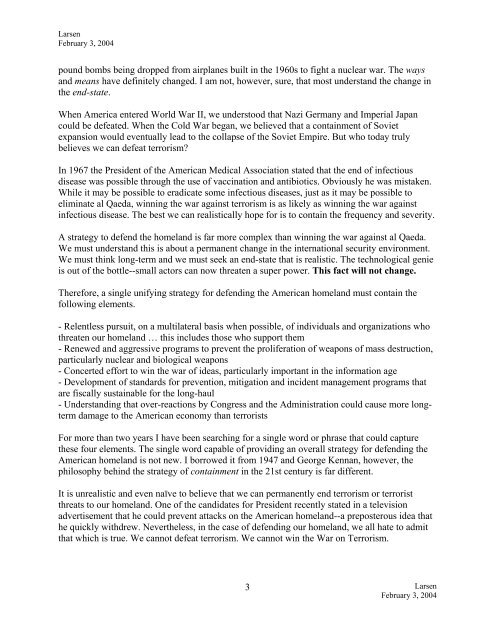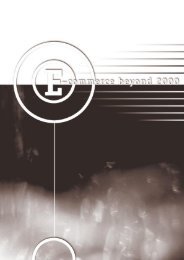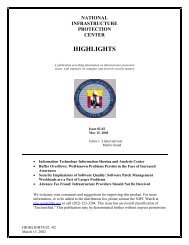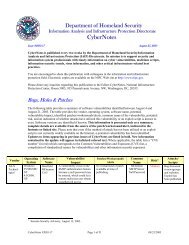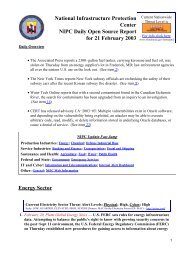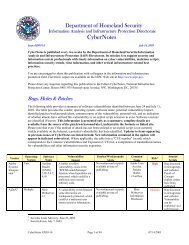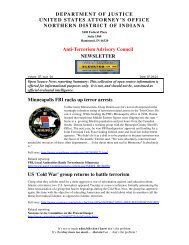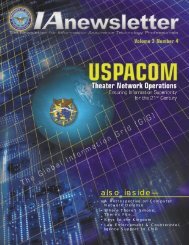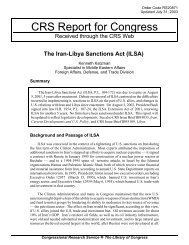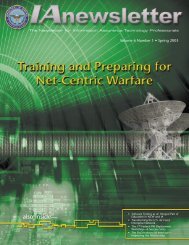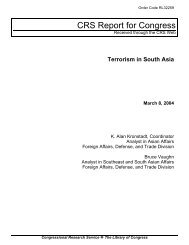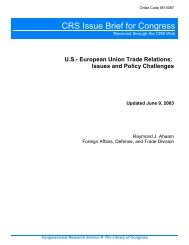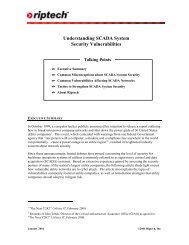Testimony of Colonel Randall J. Larsen, USAF (Ret)
Testimony of Colonel Randall J. Larsen, USAF (Ret)
Testimony of Colonel Randall J. Larsen, USAF (Ret)
Create successful ePaper yourself
Turn your PDF publications into a flip-book with our unique Google optimized e-Paper software.
<strong>Larsen</strong><br />
February 3, 2004<br />
pound bombs being dropped from airplanes built in the 1960s to fight a nuclear war. The ways<br />
and means have definitely changed. I am not, however, sure, that most understand the change in<br />
the end-state.<br />
When America entered World War II, we understood that Nazi Germany and Imperial Japan<br />
could be defeated. When the Cold War began, we believed that a containment <strong>of</strong> Soviet<br />
expansion would eventually lead to the collapse <strong>of</strong> the Soviet Empire. But who today truly<br />
believes we can defeat terrorism?<br />
In 1967 the President <strong>of</strong> the American Medical Association stated that the end <strong>of</strong> infectious<br />
disease was possible through the use <strong>of</strong> vaccination and antibiotics. Obviously he was mistaken.<br />
While it may be possible to eradicate some infectious diseases, just as it may be possible to<br />
eliminate al Qaeda, winning the war against terrorism is as likely as winning the war against<br />
infectious disease. The best we can realistically hope for is to contain the frequency and severity.<br />
A strategy to defend the homeland is far more complex than winning the war against al Qaeda.<br />
We must understand this is about a permanent change in the international security environment.<br />
We must think long-term and we must seek an end-state that is realistic. The technological genie<br />
is out <strong>of</strong> the bottle--small actors can now threaten a super power. This fact will not change.<br />
Therefore, a single unifying strategy for defending the American homeland must contain the<br />
following elements.<br />
- Relentless pursuit, on a multilateral basis when possible, <strong>of</strong> individuals and organizations who<br />
threaten our homeland … this includes those who support them<br />
- Renewed and aggressive programs to prevent the proliferation <strong>of</strong> weapons <strong>of</strong> mass destruction,<br />
particularly nuclear and biological weapons<br />
- Concerted effort to win the war <strong>of</strong> ideas, particularly important in the information age<br />
- Development <strong>of</strong> standards for prevention, mitigation and incident management programs that<br />
are fiscally sustainable for the long-haul<br />
- Understanding that over-reactions by Congress and the Administration could cause more longterm<br />
damage to the American economy than terrorists<br />
For more than two years I have been searching for a single word or phrase that could capture<br />
these four elements. The single word capable <strong>of</strong> providing an overall strategy for defending the<br />
American homeland is not new. I borrowed it from 1947 and George Kennan, however, the<br />
philosophy behind the strategy <strong>of</strong> containment in the 21st century is far different.<br />
It is unrealistic and even naïve to believe that we can permanently end terrorism or terrorist<br />
threats to our homeland. One <strong>of</strong> the candidates for President recently stated in a television<br />
advertisement that he could prevent attacks on the American homeland--a preposterous idea that<br />
he quickly withdrew. Nevertheless, in the case <strong>of</strong> defending our homeland, we all hate to admit<br />
that which is true. We cannot defeat terrorism. We cannot win the War on Terrorism.<br />
3<br />
<strong>Larsen</strong><br />
February 3, 2004


